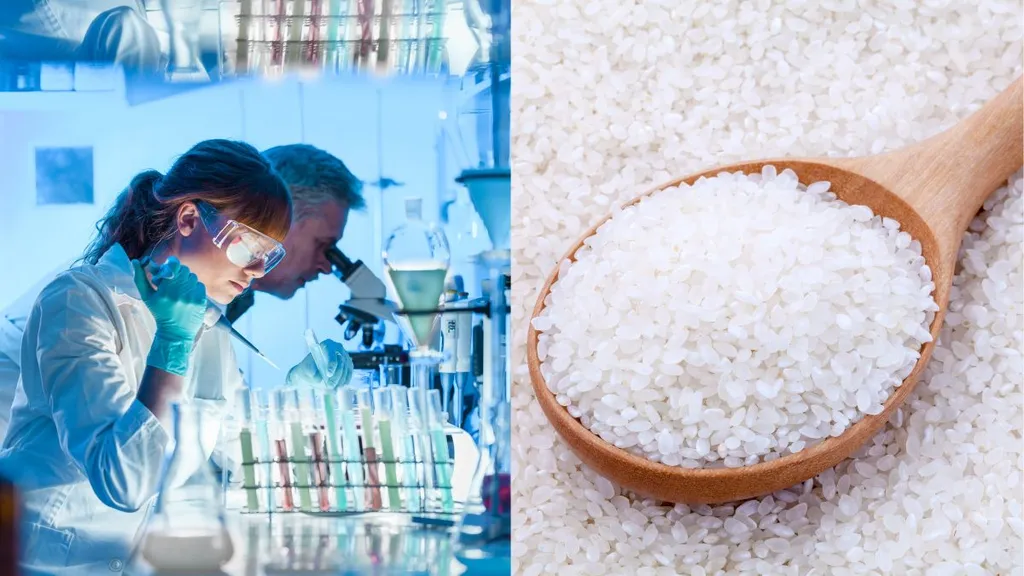In the quest to bolster crop resilience against the escalating threats of climate change, a team of researchers led by Gyeong-Min Lee from the Department of Agricultural Biotechnology at the National Institute of Agricultural Sciences in Jeonju, Korea, has made a significant stride. Their study, published in the journal *Genetically Modified Crops and Food* (formerly known as GM Crops & Food), delves into the metabolic responses of genetically modified rice to salt stress, offering insights that could revolutionize agricultural practices and energy sector investments.
The research focuses on two transgenic rice lines, Agb0103, which overexpress the CaMsrB2 gene. These lines were compared to the non-transgenic Ilmi cultivar under varying levels of salt stress. Using gas chromatography–time-of-flight mass spectrometry (GC-Tof-MS), the team profiled 63 hydrophilic and lipophilic compounds, revealing significant differences in sugars, amino acids, and organic acids between the transgenic and non-transgenic plants.
“Our study provides a foundational understanding of how metabolic changes can enhance salt stress tolerance in rice,” said Lee. “By identifying key metabolites that contribute to stress resistance, we can pave the way for developing more resilient crops.”
The findings are particularly noteworthy for the agricultural and energy sectors. Salt stress is a major abiotic stressor that significantly hampers crop productivity, leading to substantial economic losses. By understanding the metabolic mechanisms underlying salt tolerance, researchers can develop crops that are more resilient to harsh environmental conditions, thereby ensuring food security and stabilizing agricultural yields.
One of the most compelling aspects of the study is the altered accumulation of proline and γ-aminobutyric acid in the transgenic lines. These compounds are known indicators of salt-induced leaf damage, and their reduced fluctuation in the transgenic lines suggests enhanced stress tolerance. Additionally, the increased sugar content in the transgenic lines points to their role in scavenging reactive oxygen species, which are detrimental to plant health under stress conditions.
The study also highlights the contrasting trends in amino acids such as asparagine, aspartic acid, glutamine, and glutamic acid between the transgenic and non-transgenic lines. These differences are attributed to the roles of glutamic acid and glutamine in nitrogen metabolism and the involvement of glutamine synthetase in osmotic stress tolerance.
“This research not only sheds light on the metabolic pathways involved in salt stress tolerance but also opens up new avenues for genetic engineering to enhance crop resilience,” said Lee. “The potential applications of this research extend beyond rice, offering insights into improving the stress tolerance of other economically important crops.”
The implications of this research are far-reaching. By developing crops that can thrive in saline conditions, farmers can utilize previously unusable land, thereby expanding agricultural productivity. This, in turn, can lead to a more stable food supply and reduced reliance on energy-intensive irrigation methods, contributing to a more sustainable and efficient agricultural sector.
As the world grapples with the challenges of climate change and food security, studies like this one are crucial. They provide the scientific foundation for developing resilient crops that can withstand the harsh realities of a changing climate, ensuring a stable food supply for future generations.
In the words of Lee, “Our goal is to translate these findings into practical applications that can benefit farmers and the broader agricultural community. By understanding the metabolic responses to stress, we can develop crops that are not only more resilient but also more productive, ultimately contributing to global food security.”
This research not only advances our understanding of plant metabolism under stress conditions but also underscores the importance of continued investment in agricultural biotechnology. As the world faces increasing environmental challenges, the development of stress-tolerant crops will be essential for maintaining agricultural productivity and ensuring food security.

